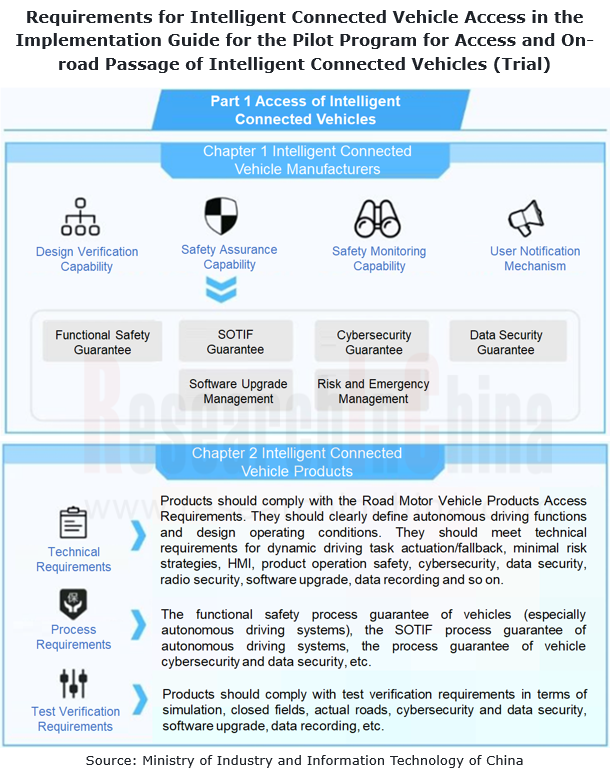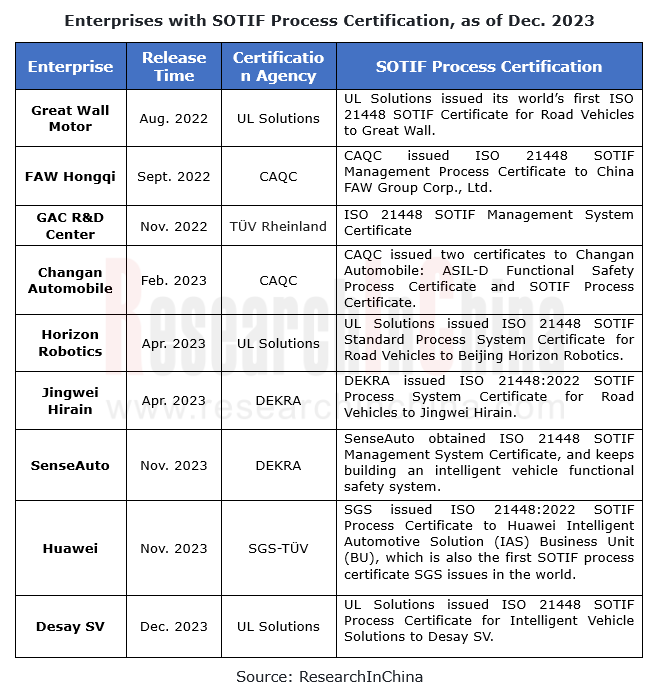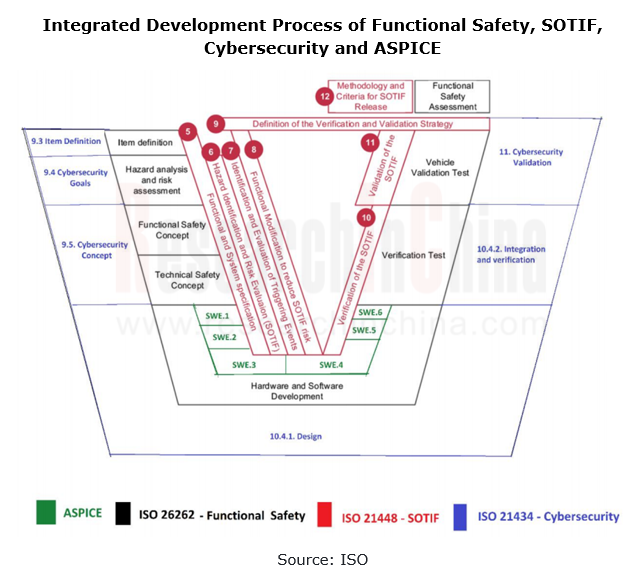Automotive Functional Safety and Safety Of The Intended Functionality (SOTIF) Research Report, 2024
As intelligent connected vehicles boom, the change in automotive EEA has been accelerated, and the risks caused by electronic and electrical failures have become ever higher. As a result, functional safety and SOTIF (safety of the intended functionality) have caught more attention, especially in the field of autonomous vehicles.
In 2023, standards and policies have speeded up the development of automotive functional safety and SOTIF in China. In addition to the latest functional safety standard GB_T 34590 2022 officially taking into effect on July 1, 2023, related Chinese departments also issued multiple policies concerning functional safety and SOTIF.
For example, in July 2023, the Ministry of Industry and Information Technology of China (MIIT) issued the "Guidelines for the Construction of National Internet of Vehicles Industry Standard System (Intelligent Connected Vehicles) (2023)", which clearly plans and guides the construction of standards for functional safety and SOTIF. In August 2023, the MIIT and other three departments jointly issued the Notice on the New Industry Standardization Pilot Project Implementation Plan (2023-2035), of which the Intelligent Connection Technologies in the New Energy Vehicle Industry stipulates the terms and definition of intelligent connected vehicles, functional safety and SOTIF processes, audits and evaluations, automotive cyber security, data security, software upgrades and other product and technology application standards.
On November 17, 2023, the MIIT, the Ministry of Public Security, the Ministry of Housing and Urban-Rural Development and the Ministry of Transport jointly issued the Notice on the Pilot Program for Access and On-road Passage of Intelligent Connected Vehicles, which officially suggests access specifications for L3/L4 autonomous driving and clarifies the responsibilities in high-level intelligent driving accidents for the first time, and simultaneously started the selection of the first batch of enterprises.
The Notice specifies the requirements for the access of automotive enterprises and vehicles, especially for their safety guarantee capabilities. Enterprises are required to have the ability to guarantee functional safety, SOTIF, cybersecurity, data security, software upgrade management, and risk and emergency management.
The requirements for process guarantee of intelligent connected vehicle products include the functional safety process guarantee of vehicles (especially autonomous driving systems), the SOTIF process guarantee of autonomous driving systems, and the process guarantee of vehicle cybersecurity and data security.

Therefore functional safety and SOTIF have become the access requirements for L3 autonomous vehicles in China, and the introduction of functional safety and SOTIF standard processes into L3 and higher-level autonomous systems has become the layout focus of OEMs and suppliers.
OEMs and suppliers greatly increase automotive functional safety processes and product certifications, and embark on the layout of SOTIF process certification.
Although ISO 26262 is not a global mandatory standard, it has been widely accepted in the automotive industry and has become the threshold for automotive supply chain players. OEMs and Tier 1 suppliers will have to reject products or vendors that are not ISO 26262-certified. As intelligent vehicles develop, both autonomous driving companies and OEMs attach ever more importance to functional safety and SOTIF.
In recent years, both international mainstream OEMs and Chinese automakers have paid more attention to and invested more heavily in functional safety and SOTIF. In particular, Chinese independent automakers such as Great Wall Motor, SAIC, Geely, GAC, Changan and BYD have all raised the requirements for functional safety development of important systems. Besides setting up functional safety teams, they actively participate in functional safety training, cooperate with third-party institutions, strictly control self-developed products and vehicle functional safety products and processes, and take suppliers' functional safety development capabilities and product functional safety capabilities as the criteria to enter their supply chains.
OEMs or suppliers put ever more emphasis on functional safety certification. According to public statistics, from January to November 2023, Chinese companies passed 114 functional safety certifications, including 41 product certifications and 73 process certifications, far more than in 2022 (about 40).
In addition to functional safety certification, the official implementation of SOTIF standards has spurred many OEMs and suppliers such as Great Wall Motor, FAW Hongqi, Changan Automobile, GAC, Horizon Robotics, Jingwei Hirain, Huawei, Desay SV and SenseAuto to deploy SOTIF processes. They have passed SOTIF process certifications in advance, laying a safety foundation for the further layout of autonomous driving systems.

Functional safety, SOTIF, cybersecurity, etc. tends to be developed in from an independent way to an integrated way.
In addition to functional safety, the development of vehicles will have to face other safety challenges in the future, such as SOTIF and cybersecurity. Functional safety and SOTIF focus on system design and verification to ensure that the system can work safely in all situations. Cybersecurity centers on external threats and attacks. In practical application, functional safety, SOTIF and cybersecurity often cross over. In the future, intelligent connected vehicles should solve all the risks related to vehicle safety before they can be delivered in large quantities. The integrated development of the three safety systems has become a major development trend of vehicle safety in the future. Multiple companies like KOSTAL, Neta, Baolong Technology and Pan-Asia Technical Automotive Center are exploring integrated development of safety.
As vehicles carry more complex embedded electronic systems, the risks incurred by software system damage and random hardware damage are increasing. Integrating the ISO 26262 functional safety standard into the Automotive Software Process Improvement and Capability dEtermination (ASPICE) to guide automotive software development will greatly improve automotive system software development quality, development efficiency and product safety.

Autonomous Driving Domain Controller and Central Computing Unit (CCU) Industry Report, 2025
Research on Autonomous Driving Domain Controllers: Monthly Penetration Rate Exceeded 30% for the First Time, and 700T+ Ultrahigh-compute Domain Controller Products Are Rapidly Installed in Vehicles
L...
China Automotive Lighting and Ambient Lighting System Research Report, 2025
Automotive Lighting System Research: In 2025H1, Autonomous Driving System (ADS) Marker Lamps Saw an 11-Fold Year-on-Year Growth and the Installation Rate of Automotive LED Lighting Approached 90...
Ecological Domain and Automotive Hardware Expansion Research Report, 2025
ResearchInChina has released the Ecological Domain and Automotive Hardware Expansion Research Report, 2025, which delves into the application of various automotive extended hardware, supplier ecologic...
Automotive Seating Innovation Technology Trend Research Report, 2025
Automotive Seating Research: With Popularization of Comfort Functions, How to Properly "Stack Functions" for Seating?
This report studies the status quo of seating technologies and functions in aspe...
Research Report on Chinese Suppliers’ Overseas Layout of Intelligent Driving, 2025
Research on Overseas Layout of Intelligent Driving: There Are Multiple Challenges in Overseas Layout, and Light-Asset Cooperation with Foreign Suppliers Emerges as the Optimal Solution at Present
20...
High-Voltage Power Supply in New Energy Vehicle (BMS, BDU, Relay, Integrated Battery Box) Research Report, 2025
The high-voltage power supply system is a core component of new energy vehicles. The battery pack serves as the central energy source, with the capacity of power battery affecting the vehicle's range,...
Automotive Radio Frequency System-on-Chip (RF SoC) and Module Research Report, 2025
Automotive RF SoC Research: The Pace of Introducing "Nerve Endings" such as UWB, NTN Satellite Communication, NearLink, and WIFI into Intelligent Vehicles Quickens
RF SoC (Radio Frequency Syst...
Automotive Power Management ICs and Signal Chain Chips Industry Research Report, 2025
Analog chips are used to process continuous analog signals from the natural world, such as light, sound, electricity/magnetism, position/speed/acceleration, and temperature. They are mainly composed o...
Global and China Electronic Rearview Mirror Industry Report, 2025
Based on the installation location, electronic rearview mirrors can be divided into electronic interior rearview mirrors (i.e., streaming media rearview mirrors) and electronic exterior rearview mirro...
Intelligent Cockpit Tier 1 Supplier Research Report, 2025 (Chinese Companies)
Intelligent Cockpit Tier1 Suppliers Research: Emerging AI Cockpit Products Fuel Layout of Full-Scenario Cockpit Ecosystem
This report mainly analyzes the current layout, innovative products, and deve...
Next-generation Central and Zonal Communication Network Topology and Chip Industry Research Report, 2025
The automotive E/E architecture is evolving towards a "central computing + zonal control" architecture, where the central computing platform is responsible for high-computing-power tasks, and zonal co...
Vehicle-road-cloud Integration and C-V2X Industry Research Report, 2025
Vehicle-side C-V2X Application Scenarios: Transition from R16 to R17, Providing a Communication Base for High-level Autonomous Driving, with the C-V2X On-board Explosion Period Approaching
In 2024, t...
Intelligent Cockpit Patent Analysis Report, 2025
Patent Trend: Three Major Directions of Intelligent Cockpits in 2025
This report explores the development trends of cutting-edge intelligent cockpits from the perspective of patents. The research sco...
Smart Car Information Security (Cybersecurity and Data Security) Research Report, 2025
Research on Automotive Information Security: AI Fusion Intelligent Protection and Ecological Collaboration Ensure Cybersecurity and Data Security
At present, what are the security risks faced by inte...
New Energy Vehicle 800-1000V High-Voltage Architecture and Supply Chain Research Report, 2025
Research on 800-1000V Architecture: to be installed in over 7 million vehicles in 2030, marking the arrival of the era of full-domain high voltage and megawatt supercharging.
In 2025, the 800-1000V h...
Foreign Tier 1 ADAS Suppliers Industry Research Report 2025
Research on Overseas Tier 1 ADAS Suppliers: Three Paths for Foreign Enterprises to Transfer to NOA
Foreign Tier 1 ADAS suppliers are obviously lagging behind in the field of NOA.
In 2024, Aptiv (2.6...
VLA Large Model Applications in Automotive and Robotics Research Report, 2025
ResearchInChina releases "VLA Large Model Applications in Automotive and Robotics Research Report, 2025": The report summarizes and analyzes the technical origin, development stages, application cases...
OEMs’ Next-generation In-vehicle Infotainment (IVI) System Trends Report, 2025
ResearchInChina releases the "OEMs’ Next-generation In-vehicle Infotainment (IVI) System Trends Report, 2025", which sorts out iterative development context of mainstream automakers in terms of infota...